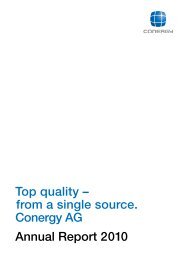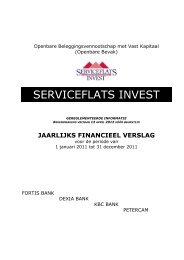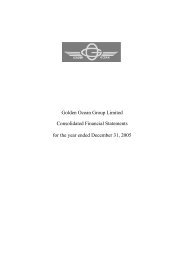BOC Report and accounts 2005 - Alle jaarverslagen
BOC Report and accounts 2005 - Alle jaarverslagen
BOC Report and accounts 2005 - Alle jaarverslagen
You also want an ePaper? Increase the reach of your titles
YUMPU automatically turns print PDFs into web optimized ePapers that Google loves.
38 The <strong>BOC</strong> Group plc Annual report <strong>and</strong> <strong>accounts</strong> <strong>2005</strong><br />
Risk factors<br />
This document contains certain forward-looking statements which involve risk <strong>and</strong> uncertainty as they relate to future<br />
events <strong>and</strong> circumstances.The following risk factors, as well as those discussed on pages 56 <strong>and</strong> 57 of the financial review<br />
could cause actual results to differ materially from those expressed or implied by these forward-looking statements:<br />
<strong>BOC</strong> is affected by the semiconductor business cycle<br />
Manufacturers of semiconductors represent <strong>BOC</strong> Edwards’ major customer base, <strong>and</strong> <strong>BOC</strong> Edwards’ profitability<br />
is directly linked to the dem<strong>and</strong> of these manufacturers for vacuum equipment, services <strong>and</strong> industrial gases.<br />
The semiconductor industry has experienced significant growth over the long term, but is cyclical in nature.<br />
Any improvements in the level of dem<strong>and</strong> for <strong>BOC</strong> Edward’s products or services may not be sustained due to<br />
reduced dem<strong>and</strong> from end users of technology products <strong>and</strong>/or excess supply of semiconductors.The competitive<br />
nature of the semiconductor industry can reduce profit margins for suppliers of products <strong>and</strong> services to<br />
semiconductor manufacturers. Either of these factors or a combination could adversely impact <strong>BOC</strong>’s financial<br />
results.Any long-term reduction in the growth pattern of the semiconductor industry could also have a negative<br />
impact on <strong>BOC</strong>’s financial results.<br />
Acquisitions may not be successful in achieving intended benefits <strong>and</strong> synergies<br />
<strong>BOC</strong> has completed a number of acquisitions in recent years as part of its growth strategy <strong>and</strong> may make<br />
acquisitions in the future.While <strong>BOC</strong> identifies expected synergies, cost savings <strong>and</strong> growth opportunities prior to<br />
completing any acquisition, these benefits may not be achieved owing to, among other things:<br />
• delays or difficulties in completing the integration of acquired companies or assets;<br />
• higher than expected costs or a need to allocate resources to manage unexpected operating difficulties;<br />
• diversion of the attention <strong>and</strong> resources of <strong>BOC</strong>’s management;<br />
• inability to retain key employees in acquired companies;<br />
• inability to retain key customers; <strong>and</strong><br />
• assumption of liabilities unrecognised in due diligence.<br />
The growth of <strong>BOC</strong>’s gases business will depend on the ability to win <strong>and</strong> execute large<br />
projects profitably<br />
<strong>BOC</strong>, through its Process Gas Solutions (PGS) line of business, has a strategy for growth that requires significant<br />
investment each year to serve key customers in different geographies. Failure to execute projects successfully for<br />
these customers will impact PGS’s ability to win new projects from these customers, <strong>and</strong> therefore may impact<br />
<strong>BOC</strong>’s future financial results.The specific risks associated with major projects include:<br />
• failure to complete the project on time owing to unforeseen construction problems (which may require <strong>BOC</strong><br />
to pay penalties under the terms of the customer contract);<br />
• failure of the plant to deliver the contracted volumes <strong>and</strong> quantities of product required by the customer<br />
because of design errors or errors in manufacturing or construction (which may require <strong>BOC</strong> to pay penalties<br />
under the terms of the customer contract); <strong>and</strong><br />
• inability to operate the plant at costs assumed in <strong>BOC</strong>’s financial evaluation of the project.<br />
The safety of <strong>BOC</strong>’s operations is critical to success<br />
Industrial gases are hazardous substances <strong>and</strong> <strong>BOC</strong> recognises that managing safety in operations, transportation<br />
<strong>and</strong> products is critical to achieve growth <strong>and</strong> financial results. Failure to maintain high levels of safety can result in a<br />
number of negative outcomes, including:<br />
• fines <strong>and</strong> penalties for breaches of safety laws;<br />
• liability payments <strong>and</strong> costs to employees or third parties arising from injury or damage;<br />
• exclusion from certain market sectors deemed important for future development of the business<br />
(such as medical gases); <strong>and</strong><br />
• damage to reputation.<br />
Additionally managing social, environmental <strong>and</strong> ethical matters is key to <strong>BOC</strong>’s reputation.<br />
<strong>BOC</strong> operates in over 50 different countries <strong>and</strong> is therefore exposed to economic, political,<br />
business <strong>and</strong> natural catastrophe risks associated with international operations<br />
<strong>BOC</strong>’s overall success as a business with global operations depends, in part, upon its ability to succeed in differing<br />
economic, political <strong>and</strong> business conditions. <strong>BOC</strong> encounters different legal <strong>and</strong> regulatory requirements in<br />
numerous jurisdictions.These include taxation laws, environmental regulations, regulations concerning operational<br />
st<strong>and</strong>ards <strong>and</strong> competition laws. <strong>BOC</strong> is also confronted by political risks such as the expropriation of assets <strong>and</strong><br />
the inability to export currency.The business risks <strong>and</strong> challenges faced in each geography include the need to<br />
manage credit risks of local customers, appointing <strong>and</strong> retaining key staff, general economic conditions locally <strong>and</strong><br />
currency fluctuation. Recognition of changing market conditions in local geographies is critical to <strong>BOC</strong>’s long-term<br />
success, particularly those where <strong>BOC</strong> anticipates significant investments to achieve growth, for example China.<br />
Additionally, a good underst<strong>and</strong>ing of political <strong>and</strong> economic risks is essential to achieve success from investments in<br />
new geographies. <strong>BOC</strong>’s operations are exposed to varying degrees of natural catastrophe risk, such as earthquake<br />
<strong>and</strong> flood, as well as security risk, in the different countries in which <strong>BOC</strong> operates.<br />
<strong>BOC</strong> operates in a highly competitive environment<br />
The industrial gases market is very competitive, with several large competitors <strong>and</strong> a significant number of smaller<br />
local competitors in different territories.Although the current trend in the industry is to seek price increases for<br />
industrial gases, the industry has experienced falling prices in previous years.There is no guarantee that the current<br />
trend will continue <strong>and</strong> there is a risk that competitors will seek to maintain or increase market shares by reducing<br />
prices.These price reductions would result in lower revenues, profits <strong>and</strong> cash flows.

















